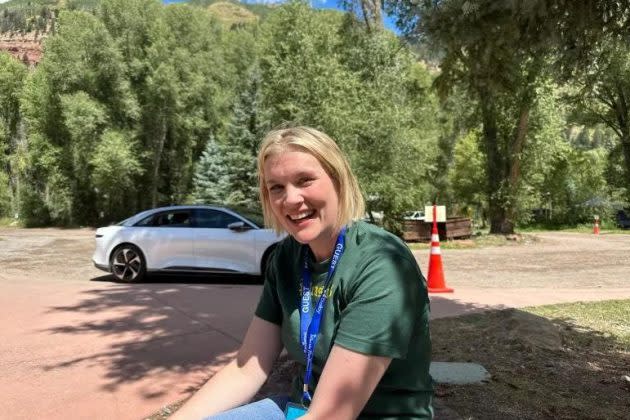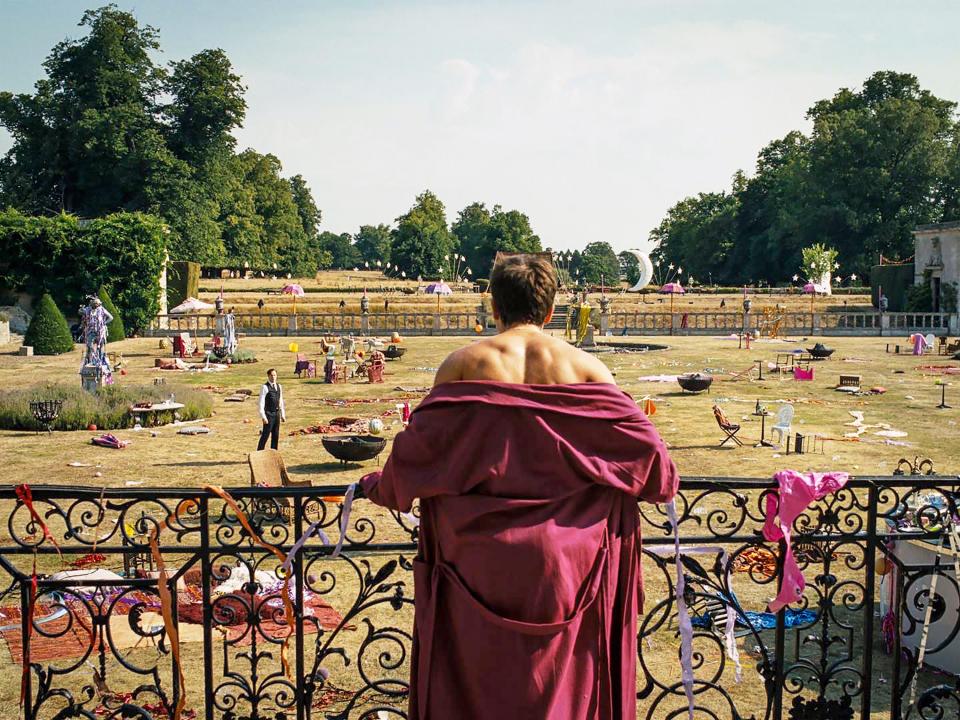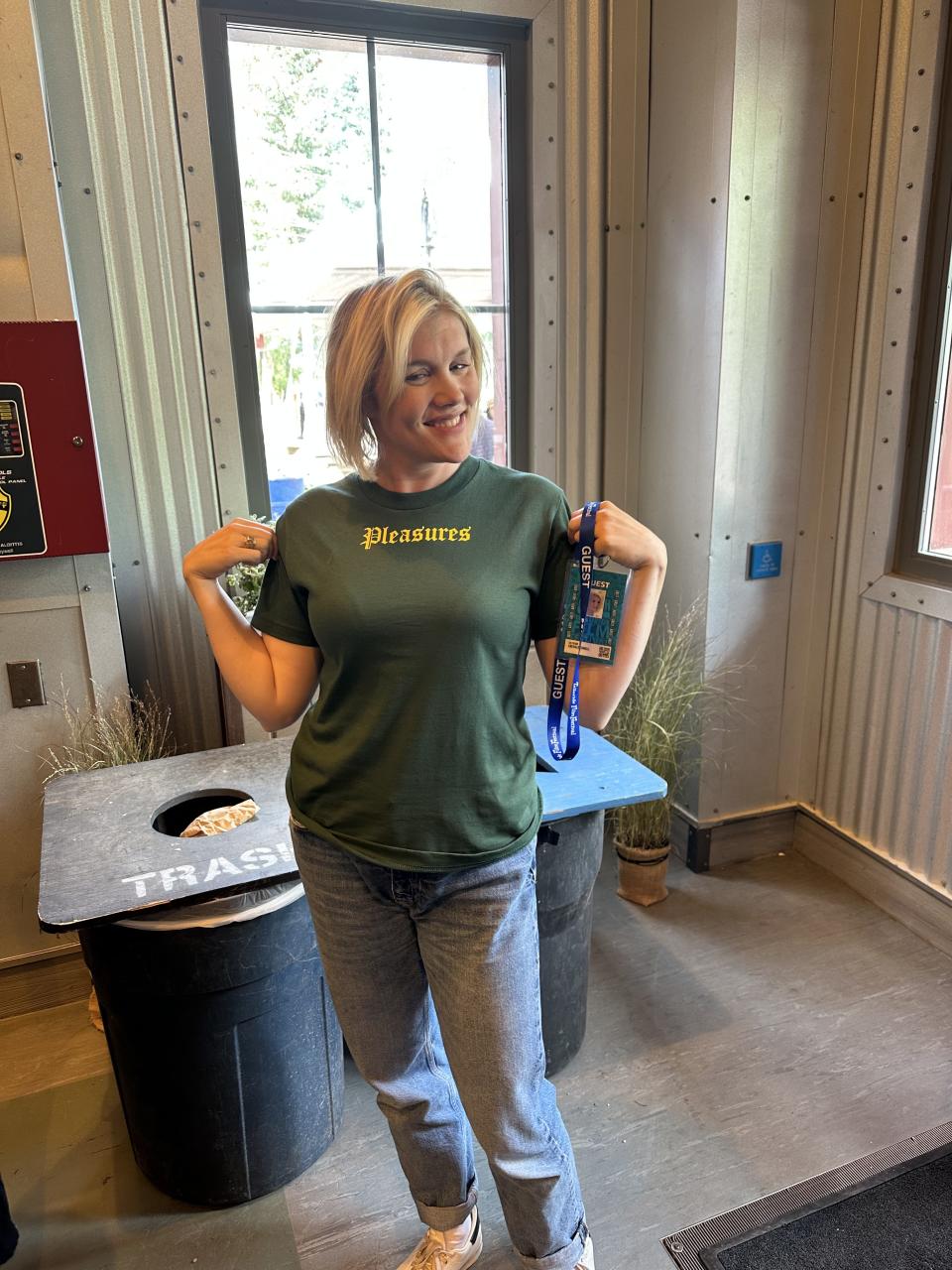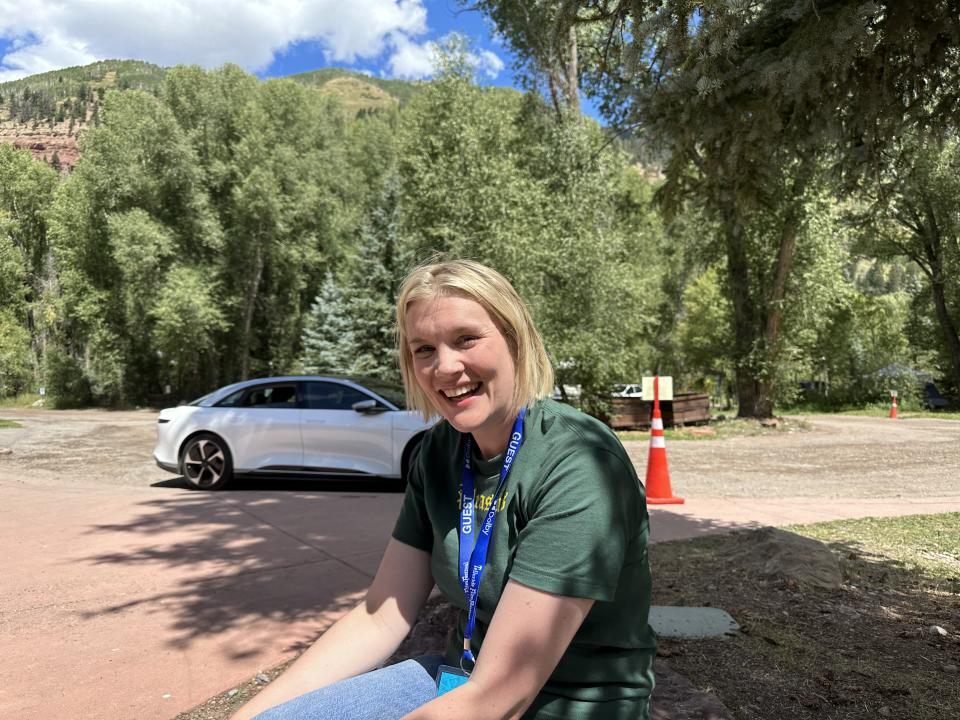Breaking Baz at Telluride: Emerald Fennell Says Making ‘Saltburn’ Was Like “Taking My Clothes Off And Exposing Myself”
- Oops!Something went wrong.Please try again later.
- Oops!Something went wrong.Please try again later.
- Oops!Something went wrong.Please try again later.

EXCLUSIVE: Emerald Fennell likened making Saltburn, her dangerously dark comedy of class and lack of manners, “to taking your clothes off and exposing yourself.”
The filmmaker, who won an Oscar and BAFTAs for her debut feature Promising Young Woman, clarified that the “transgressive” material that she’s interested in working on means “that you have to spend a lot of your time as a director saying, ‘Trust me, I think this how we’re going to do it.’ And so then people watch it, which is so thrilling. But yeah, you are showing yourself. You are taking your clothes off and exposing yourself.”
More from Deadline
She added that Saltburn, while made on a big canvas, is a ”very intimate“ movie.
She told me during a long conversation at the Telluride Film Festival, where the film had its world premiere, that this is a film “about needing and wanting and desire and sex.”
RELATED: Telluride Film Festival 2023: All Of Deadline’s Movie Reviews
Saltburn exposes the cruel tricks and dastardly traps set by titled British upper classes; systems that could just as easily apply to those living at the top of the class structure in, say, Hollywood, the Cote d’Azur, Rome, Sydney, any place really where fabulous wealth can often encourage vile, bloodsucking behavior.
Sadly, I have observed such actions close up.
Early on in my career, I covered the posh party scene at snotty London nightclubs and studied the abhorrent goings-on of the British upper classes at play, something that Fennell observes with savage comic acuity in Saltburn, which will next open the BFI London Film Festival on October 4.
RELATED: 2023 Film Festival Calendar
Fennell cast Barry Keoghan (The Banshees of Inisherin, The Killing of a Sacred Deer), who’s on sublimely cracking form here, as Oliver Quick, an Oxford University undergraduate straight out of Ealing comedy Kind Hearts and Coronets and Noel Coward’s vicious Hay Fever.
Fennell also has nods to Evelyn Waugh’s Brideshead Revisited, Daphne du Maurier’s Rebecca, and Emily Brontë’s Wuthering Heights. And let’s not forget a splash of Gosford Park and Downton Abbey.
Keoghan’s Quick has dreamt of being at home under Oxford’s towering spires. He wants to belong there, but that’s another trap.
Being socially unaware in that town is a no-no, and so he’s treated cruelly. He turns up smartly dressed in the college attire and he’s read the complete reading list.
“Actually, you should dress as though you haven’t washed in five days. You shouldn’t read the reading list. In fact, you should be glamorous and kind of undermining,“ said Fennell, who studied at Marlborough and Oxford in the UK.
That’s another nasty trap, she said.
Quick aspires to mix with the high-class clique led by Jacob Elordi’s (Euphoria) Felix Catton, whose family owns a huge estate called, as it happens, Saltburn. His family’s history stretches back to Henry VIII, and it’s stuffed with priceless art and bad plumbing.

Quick very quickly gains entry to Catton’s circle, and very soon is introduced to his family.
Felix’s titled parents are played with exquisite comic timing by Rosamund Pike (An Education, Gone Girl) and Richard E. Grant (Can You Ever Forgive Me?, Withnail & I); their daughter, Venetia, is played by newcomer Alison Oliver (Conversations with Friends); a cousin who has to beg for every penny is played by Archie Madekwe (Gran Turismo, Midsommar); and a family friend who has overstayed her welcome is captured superbly by Carey Mulligan (Drive, Maestro, The Dig), the star of Fennell’s Promising Young Woman.
And Paul Rhys (Borgia, Victoria, A Discovery of Witches) plays Duncan, a sort of male Mrs. Danvers, [from Rebecca] except that for this Mr. Danvers, Saltburn is his master.
Fennell sharply observes the tribal behavior of the upper classes and how they ruthlessly repel those who pose a threat.
That’s where all the rules and regulations come in. Staying at Saltburn for the summer is a nightmare.
Unless you’re born into it, or have spent the weekend at a country pile with butlers and servants, how do you know that you serve your own breakfast, but order how you want your eggs?
Or that dressing for dinner means black-tie complete with cuff links and a jacket that doesn’t cover the cuffs of your starched white shirt?
And how could you possibly know that Pike’s lady of the manor can’t abide unshaven men because beards and stubble horrify her?
I saw the film at its world premiere screening Thursday night, and when I saw it again Friday morning, I darn well made sure I shaved, because I knew that at some point during the day I would be interviewing the film’s director and screenwriter.
Fennell discussed removing her clothes metaphorically, but she had her cast disrobe and expose themselves.
Keoghan is seen in all his glory more than once.
“Yes, you see some nudity,” Fennell conceded, but noted, “The number of movies that we see of women for no reason, who have one line, topless having sex with the main character, and it’s never commented on.
“In this movie, the things that are transgressive are in our minds. We’re imagining it. We are imagining all that,” she argued.
“The thing is about the nudity in this film, when you get the real nudity, it’s actually not about sex.“
Fennell said that Keoghan “read the script and he knew what the film was aiming to do and to be, and that’s what he wanted. That’s what’s exciting. And so obviously the intimacy coordinators, all of that stuff were involved. Consent is so important to me. And the reason is because, like anything, like any partner, you want it to be completely consensual. You want it to be that it’s something that you both absolutely want and understand. And that is the thing about Barry that’s so exceptional, is that he has absolutely no fear or shame,” she told me.
Fennell told me that she had the same kind of relationship with Keoghan that she had with Mulligan on Promising Young Woman. ”The thing I had with Carey and the thing I had with Barry is that you need to understand each other in a really profound way.”
The filmmaker said that she and her leading man “are in it for the same reasons; which is, we want to go there. That Barry’s driven there. It’s all blood and guts with him, as well as this coolness, this beautiful coolness.”
That’s why, she said, the scenes he does with someone like Pike are so funny.
On set, she and Keoghan “were a little bit like brother and sister. We both understood each other, we were naughty children together. Sometimes he and I would share a look and he’d be like, ’Okay.’ ”

Fennell wants audiences to have a visceral reaction to her film. Some might find certain scenes extreme and dark and will be offended by them, while others will find them amusing.
All the better if they squirm and scream collectively in their seats, she said.
“I am a huge genre fan. I love romance, I love horror. But what I love about comedy and horrors, you feel the scream when you’re in a room together.
“I feel so strongly about being in a movie theater, because you are feeling the hairs on the arm of the person next to you. You are together. You can hear them gasp, you can hear them breathe, you can hear their reaction,” she said, smiling.
But there are a couple of scenes that are extreme and dark and some might find such moments, which I won’t spoil here, troubling.
Fennell suggested that in a room, “people pick up on different things at different times. People are aroused by things. People are disgusted by things. It’s a kind of constant, moving thing. I think that if you can make people physically feel something, that’s a rollercoaster, it’s kind of the thing, the kind of filmmakers that I love, maybe people like Kubrick.
“You are in this constant tension between the super real, the super surreal in a funny way, but something that you completely understand.
“I feel so much, especially as I get older, that we are all so, so conflicted.”
By way of explanation, Fennell noted Sir Thomas More, Henry VIII’s Lord Chancellor.
More wrote Utopia. “He coined the word, he wrote the book, and it is the most beautiful socialist work of art. It is about us all, it’s about everyone being together.
“And then he absolutely loved burning heretics. He loved it.”
We all do mad things when we think no one is watching, she said.
Fennell cited a British woman known as the cat bin lady, who was caught on CCTV sweeping a tabby into a waste bin on her way home from work.
“This is a seemingly ordinary woman and the thing that I am so interested in, is what we do when we are not watched, how we see ourselves, how in denial we all are about who we are, how at odds” it is with our private and public selves.
“I find it very complicated, because, of course, the way I see myself in my everyday life is not how others see me.

“None of us are seen by anyone as the way we see ourselves. We are all constantly a kind of complicated half-truth,” she said, worrying that it all might sound so “wanky.”
With Saltburn, she said, “It’s about, do you guys think about wanting, do you guys think about what our sadomasochistic relationship is currently with the things that we want so much? Like it could be all sorts of things. What is that? And how do we navigate it and why is it endlessly so alluring?”
She asked what is it about the nature of our desires that they are so intertwined with rage, actually.
There’s a quote from Catherine Breillat (The Sleeping Beauty), “where she said something like “beauty thrives on degradation,” and I think that’s the thing for me.
“There’s no feeling without its counter-feeling. When you look at children,” said Fennell, who has a son and a daughter aged under 4, “and you see that thing so potently that when they want to hug something they want to hug it to death. When they’re incredibly frightened they laugh.
“It’s just a basic human instinct. There’s no feeling without the opposite feeling. It’s how we exist.”
So it makes sense that nothing is frictionless. “The people often that we most loathe are the ones we want the most,” she said. “The things that we find abhorrent, we also can’t stop looking at, and for me in this movie, I love everyone. I understand everyone.
“With Promising Young Woman, I was so so careful to remember that nobody thinks they’re a bad person.
“Olivier Quick, however, is an interesting one, because I don’t think he cares. He’s a kind of fascinatingly ambivalent person, driven in a kind of fascinating way. He is our throbbing desire.”
Fennell said that it’s the upper classes in Saltburn who are the “vampires. They’re grief vampires. They are poverty vampires. The way that they treat the people.”
She mentioned a scene involving Elordi’s Felix, who is being so charming with Oliver, “and then he just goes up to a girl and just spanks her off. Doesn’t even speak to her, just ushers her away. Who is the vampire? Who are the vampires here?
“We are all sucking at something.”
Fennell admits that “not everyone will get it. Not everyone will find it sexy, not everyone will find it funny. It’s a difficult one because this is a funny movie, I think. It’s a rich stew. And obviously, if you’re going to serve up a rich stew, some people are going to swallow it and some people won’t want to. And this is the thing that I learned with the last film, and this is the thing I feel so strongly and why I’m so grateful to get to work with so many people who are such amazing collaborators and who believe in it as much.”
The behavior depicted in Saltburn is animal, Fennell said. ”Every time an atrocity happens, people say, “We just didn’t see it coming. We didn’t see it coming. We didn’t see it coming.” But I see it coming because I feel like every day I am aware of how animal we all are and how close to something really frightening we are. And that’s what we love, that’s what any kind of power, any of those really strong, potent feelings that they get to the animal.”
We’re living in a very strange time of extreme plenty and extreme poverty, because of social media, Fennell noted.
“We are seeing each other all the time. We are looking at each other. We’re looking at what people are eating, we’re looking at the surgery they’ve done. … It’s a state of arousal, of acquiring, of needing. And as the world is sort of disintegrating, we’re just preoccupied with the things that have always preoccupied us, which are very human. I’m not disapproving of it. I don’t have any judgment about it. You know, I want things, I want things.”
What does Emerald Fennell want the most, though?
“You’re asking the wrong person, because I don’t actually know myself, because there’s nobody more in denial. My real wants, I suppose, are so deep and so transgressive that I wouldn’t want to look at them.”
But what do you really want, I asked again.
“A Big Mac with pickles,” she said, laughing.

By way of explanation, Fennell said, ”I’ve lived inside my own head for a lot of my life. That sounds so f*cking grandiose. But the kind of parallel universe that I live in, which is my imagination, is strange, I suppose, in some ways, but my everyday life is very straightforward. You know, I’m very boring, I think, in lots of ways. I think the animal lives in a different place and the animal generally ends up in the movies I make.”
Her children were aged 1 and 3 during the shoot, “and you are not sleeping because you are with them every night. It would’ve been easier to make something less complicated maybe, and hard, because the sacrifices that you make personally are so big. But there’s also something about having children that is so visceral and so dark. So dark.
“What I found was that I’ve never felt more animal. I’ve never felt more in touch with how terrifying the world is.
“What you’ve done is elected to bring a love into your life that will also make your life impossible to live, because it is so deep and so frightening, and you have basically … you are just living in terror as much as love.”
After winning awards and accolades for Promising Young Woman, Fennell could have chosen to make all kinds of Hollywood nonsense for mega bucks. I admire her, because she chose not to. She again partnered with Margot Robbie’s LuckyChap Entertainment, and the Saltburn project was taken up by MGM/Amazon.
“I honestly think though that it’s not a choice. I don’t how to be good at those things. I can only really do this thing. I wouldn’t be any good at that, at those big things.
“And also, I’ve got so much admiration for people who do make those moves. It looks f*cking hard. You know, that is hard. Those kind of moves are really hard to make, let alone the ones that are really, really great.”
I wondered whether she’d ever be interested in directing a James Bond movie, because she would be able to bring a super comedic vibe to one.
She wasn’t falling into that trap. No way. “I’m not answering that today,” she said, cracking up.
Best of Deadline
Venice Film Festival 2023 Photos: David Fincher, ‘The Killer' & 'The Beast' Premieres
2023 Premiere Dates For New & Returning Series On Broadcast, Cable & Streaming
Sign up for Deadline's Newsletter. For the latest news, follow us on Facebook, Twitter, and Instagram.

